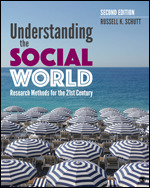Understanding the Social World
Research Methods for the 21st Century
Second Edition
- Russell K. Schutt - University of Massachusetts Boston, USA
January 2020 | 368 pages | SAGE Publications, Inc
The author is a proud sponsor of the 2020 Sage Keith Roberts Teaching Innovations Award—enabling graduate students and early career faculty to attend the annual ASA pre-conference teaching and learning workshop.
Understanding the Social World: Research Methods for the 21st Century is a concise and accessible introduction to the process and practice of social science research. Fast-paced and visually engaging, the text crosses disciplinary and national boundaries, pays special attention to concern for human subjects, and focuses on the application of results. As it rises to the requirements of a world shaped by big data and social media, Instagram and avatars, blogs and tweets, the text also confronts the research challenges posed by cell phones, privacy concerns, linguistic diversity, and multicultural populations.
The Second Edition discusses newly-popular research methods, highlights the fascinating work being conducted by contemporary social researchers, and includes enhanced tools for learning in the text and online.
Included with this title:
The password-protected Instructor Resource Site (formally known as Sage Edge) offers access to all text-specific resources, including a test bank and editable, chapter-specific PowerPoint® slides. Learn more.
Understanding the Social World: Research Methods for the 21st Century is a concise and accessible introduction to the process and practice of social science research. Fast-paced and visually engaging, the text crosses disciplinary and national boundaries, pays special attention to concern for human subjects, and focuses on the application of results. As it rises to the requirements of a world shaped by big data and social media, Instagram and avatars, blogs and tweets, the text also confronts the research challenges posed by cell phones, privacy concerns, linguistic diversity, and multicultural populations.
The Second Edition discusses newly-popular research methods, highlights the fascinating work being conducted by contemporary social researchers, and includes enhanced tools for learning in the text and online.
Included with this title:
The password-protected Instructor Resource Site (formally known as Sage Edge) offers access to all text-specific resources, including a test bank and editable, chapter-specific PowerPoint® slides. Learn more.
About the Author
Preface
Acknowledgments
Section I. Foundations for Social Research
Chapter 1. Science, Society, and Social Research
Chapter 2. The Process and Problems of Social Research
Chapter 3. Research Ethics
Section II. Fundamentals of Social Research
Chapter 4. Conceptualization and Measurement
Chapter 5. Generalizability and Sampling
Chapter 6. Causation and Experimental Design
Section III. Basic Social Research Designs
Chapter 7. Survey Research
Chapter 8. Qualitative Methods
Chapter 9. Unobtrusive Methods
Section IV. Analysis and Reporting of Social Research
Chapter 10. Quantitative Data Analysis
Chapter 11. Qualitative Data Analysis
Chapter 12. Summarizing and Reporting Research
Appendix A: Questions to Ask About a Research Article
Appendix B: How to Read a Research Article
Glossary
Bibliography
Index
On the Study Site
edge.sagepub.com/schuttusw2
Appendix C: Table of Random Numbers
Appendix D: How to Use a Statistical Package
Appendix E: Annotated List of Web Sites
It covers general foundation of social science research.
Social Sciences Dept, Warren Wilson College
December 30, 2020


 Sage College Publishing
Sage College Publishing
